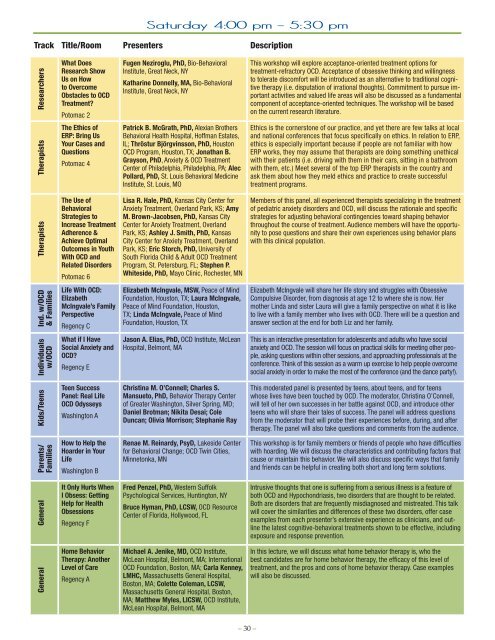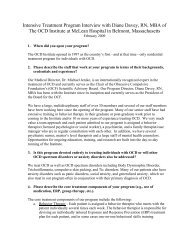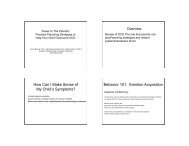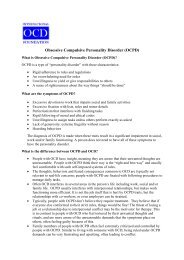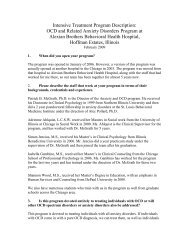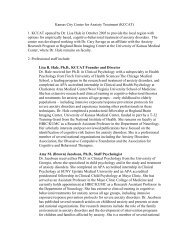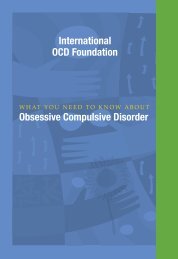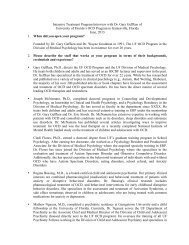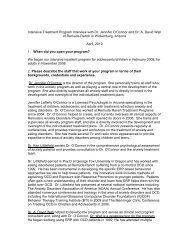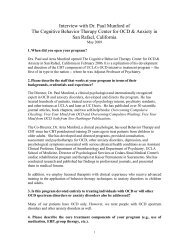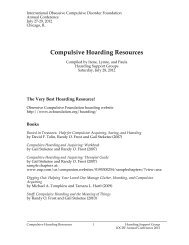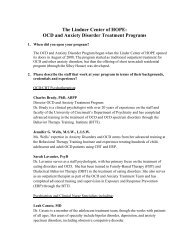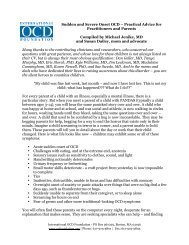Friday 8:00 am â 9:00 am - Obsessive Compulsive Foundation
Friday 8:00 am â 9:00 am - Obsessive Compulsive Foundation
Friday 8:00 am â 9:00 am - Obsessive Compulsive Foundation
You also want an ePaper? Increase the reach of your titles
YUMPU automatically turns print PDFs into web optimized ePapers that Google loves.
Saturday 4:<strong>00</strong> pm – 5:30 pmTrack Title/Room Presenters DescriptionResearchersWhat DoesResearch ShowUs on Howto OvercomeObstacles to OCDTreatment?Potomac 2Fugen Neziroglu, PhD, Bio-BehavioralInstitute, Great Neck, NYKatharine Donnelly, MA, Bio-BehavioralInstitute, Great Neck, NYThis workshop will explore acceptance-oriented treatment options fortreatment-refractory OCD. Acceptance of obsessive thinking and willingnessto tolerate discomfort will be introduced as an alternative to traditional cognitivetherapy (i.e. disputation of irrational thoughts). Commitment to pursue importantactivities and valued life areas will also be discussed as a fund<strong>am</strong>entalcomponent of acceptance-oriented techniques. The workshop will be basedon the current research literature.TherapistsThe Ethics ofERP: Bring UsYour Cases andQuestionsPotomac 4Patrick B. McGrath, PhD, Alexian BrothersBehavioral Health Hospital, Hoffman Estates,IL; Thröstur Björgvinsson, PhD, HoustonOCD Progr<strong>am</strong>, Houston, TX; Jonathan B.Grayson, PhD, Anxiety & OCD TreatmentCenter of Philadelphia, Philadelphia, PA; AlecPollard, PhD, St. Louis Behavioral MedicineInstitute, St. Louis, MOEthics is the cornerstone of our practice, and yet there are few talks at localand national conferences that focus specifically on ethics. In relation to ERP,ethics is especially important because if people are not f<strong>am</strong>iliar with howERP works, they may assume that therapists are doing something unethicalwith their patients (i.e. driving with them in their cars, sitting in a bathroomwith them, etc.) Meet several of the top ERP therapists in the country andask them about how they meld ethics and practice to create successfultreatment progr<strong>am</strong>s.TherapistsThe Use ofBehavioralStrategies toIncrease TreatmentAdherence &Achieve OptimalOutcomes in YouthWith OCD andRelated DisordersPotomac 6Lisa R. Hale, PhD, Kansas City Center forAnxiety Treatment, Overland Park, KS; AmyM. Brown-Jacobsen, PhD, Kansas CityCenter for Anxiety Treatment, OverlandPark, KS; Ashley J. Smith, PhD, KansasCity Center for Anxiety Treatment, OverlandPark, KS; Eric Storch, PhD, University ofSouth Florida Child & Adult OCD TreatmentProgr<strong>am</strong>, St. Petersburg, FL; Stephen P.Whiteside, PhD, Mayo Clinic, Rochester, MNMembers of this panel, all experienced therapists specializing in the treatmentof pediatric anxiety disorders and OCD, will discuss the rationale and specificstrategies for adjusting behavioral contingencies toward shaping behaviorthroughout the course of treatment. Audience members will have the opportunityto pose questions and share their own experiences using behavior planswith this clinical population.Ind. w/OCD& F<strong>am</strong>iliesLife With OCD:ElizabethMcIngvale’s F<strong>am</strong>ilyPerspectiveRegency CElizabeth McIngvale, MSW, Peace of Mind<strong>Foundation</strong>, Houston, TX; Laura McIngvale,Peace of Mind <strong>Foundation</strong>, Houston,TX; Linda McIngvale, Peace of Mind<strong>Foundation</strong>, Houston, TXElizabeth McIngvale will share her life story and struggles with <strong>Obsessive</strong><strong>Compulsive</strong> Disorder, from diagnosis at age 12 to where she is now. Hermother Linda and sister Laura will give a f<strong>am</strong>ily perspective on what it is liketo live with a f<strong>am</strong>ily member who lives with OCD. There will be a question andanswer section at the end for both Liz and her f<strong>am</strong>ily.Individualsw/OCDWhat if I HaveSocial Anxiety andOCD?Regency EJason A. Elias, PhD, OCD Institute, McLeanHospital, Belmont, MAThis is an interactive presentation for adolescents and adults who have socialanxiety and OCD. The session will focus on practical skills for meeting other people,asking questions within other sessions, and approaching professionals at theconference. Think of this session as a warm up exercise to help people overcomesocial anxiety in order to make the most of the conference (and the dance party!).Kids/TeensTeen SuccessPanel: Real LifeOCD OdysseysWashington AChristina M. O’Connell; Charles S.Mansueto, PhD, Behavior Therapy Centerof Greater Washington, Silver Spring, MD;Daniel Brotman; Nikita Desai; ColeDuncan; Olivia Morrison; Stephanie RayThis moderated panel is presented by teens, about teens, and for teenswhose lives have been touched by OCD. The moderator, Christina O’Connell,will tell of her own successes in her battle against OCD, and introduce otherteens who will share their tales of success. The panel will address questionsfrom the moderator that will probe their experiences before, during, and aftertherapy. The panel will also take questions and comments from the audience.Parents/F<strong>am</strong>iliesHow to Help theHoarder in YourLifeWashington BRenae M. Reinardy, PsyD, Lakeside Centerfor Behavioral Change; OCD Twin Cities,Minnetonka, MNThis workshop is for f<strong>am</strong>ily members or friends of people who have difficultieswith hoarding. We will discuss the characteristics and contributing factors thatcause or maintain this behavior. We will also discuss specific ways that f<strong>am</strong>ilyand friends can be helpful in creating both short and long term solutions.GeneralIt Only Hurts WhenI Obsess: GettingHelp for HealthObsessionsRegency FFred Penzel, PhD, Western SuffolkPsychological Services, Huntington, NYBruce Hyman, PhD, LCSW, OCD ResourceCenter of Florida, Hollywood, FLIntrusive thoughts that one is suffering from a serious illness is a feature ofboth OCD and Hypochondriasis, two disorders that are thought to be related.Both are disorders that are frequently misdiagnosed and mistreated. This talkwill cover the similarities and differences of these two disorders, offer caseex<strong>am</strong>ples from each presenter’s extensive experience as clinicians, and outlinethe latest cognitive-behavioral treatments shown to be effective, includingexposure and response prevention.GeneralHome BehaviorTherapy: AnotherLevel of CareRegency AMichael A. Jenike, MD, OCD Institute,McLean Hospital, Belmont, MA; InternationalOCD <strong>Foundation</strong>, Boston, MA; Carla Kenney,LMHC, Massachusetts General Hospital,Boston, MA; Colette Coleman, LCSW,Massachusetts General Hospital, Boston,MA; Matthew Myles, LICSW, OCD Institute,McLean Hospital, Belmont, MAIn this lecture, we will discuss what home behavior therapy is, who thebest candidates are for home behavior therapy, the efficacy of this level oftreatment, and the pros and cons of home behavior therapy. Case ex<strong>am</strong>pleswill also be discussed.– 30 –


